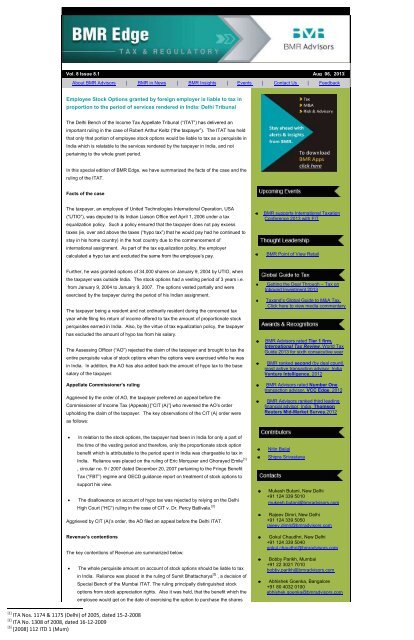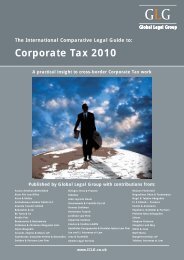Employee Stock Options granted by foreign employer is liable to tax ...
Employee Stock Options granted by foreign employer is liable to tax ...
Employee Stock Options granted by foreign employer is liable to tax ...
You also want an ePaper? Increase the reach of your titles
YUMPU automatically turns print PDFs into web optimized ePapers that Google loves.
Vol. 8 Issue 8.1 Aug 06, 2013<br />
About BMR Adv<strong>is</strong>ors | BMR in News | BMR Insights | Events | Contact Us | Feedback<br />
<strong>Employee</strong> <strong>S<strong>to</strong>ck</strong> <strong>Options</strong> <strong>granted</strong> <strong>by</strong> <strong>foreign</strong> <strong>employer</strong> <strong>is</strong> <strong>liable</strong> <strong>to</strong> <strong>tax</strong> in<br />
proportion <strong>to</strong> the period of services rendered in India: Delhi Tribunal<br />
The Delhi Bench of the Income Tax Appellate Tribunal (“ITAT”) has delivered an<br />
important ruling in the case of Robert Arthur Keltz (“the <strong>tax</strong>payer”). The ITAT has held<br />
that only that portion of employee s<strong>to</strong>ck options would be <strong>liable</strong> <strong>to</strong> <strong>tax</strong> as a perqu<strong>is</strong>ite in<br />
India which <strong>is</strong> relatable <strong>to</strong> the services rendered <strong>by</strong> the <strong>tax</strong>payer in India, and not<br />
pertaining <strong>to</strong> the whole grant period.<br />
In th<strong>is</strong> special edition of BMR Edge, we have summarized the facts of the case and the<br />
ruling of the ITAT.<br />
Facts of the case<br />
The <strong>tax</strong>payer, an employee of United Technologies International Operation, USA<br />
(“UTIO”), was deputed <strong>to</strong> its Indian Lia<strong>is</strong>on Office wef April 1, 2006 under a <strong>tax</strong><br />
equalization policy. Such a policy ensured that the <strong>tax</strong>payer does not pay excess<br />
<strong>tax</strong>es (ie, over and above the <strong>tax</strong>es (“hypo <strong>tax</strong>”) that he would pay had he continued <strong>to</strong><br />
stay in h<strong>is</strong> home country) in the host country due <strong>to</strong> the commencement of<br />
international assignment. As part of the <strong>tax</strong> equalization policy, the <strong>employer</strong><br />
calculated a hypo <strong>tax</strong> and excluded the same from the employee’s pay.<br />
BMR supports International Taxation<br />
Conference 2013 with FIT<br />
BMR Point of View Retail<br />
Further, he was <strong>granted</strong> options of 34,000 shares on January 9, 2004 <strong>by</strong> UTIO, when<br />
the <strong>tax</strong>payer was outside India. The s<strong>to</strong>ck options had a vesting period of 3 years i.e.<br />
from January 9, 2004 <strong>to</strong> January 9, 2007. The options vested partially and were<br />
exerc<strong>is</strong>ed <strong>by</strong> the <strong>tax</strong>payer during the period of h<strong>is</strong> Indian assignment.<br />
The <strong>tax</strong>payer being a resident and not ordinarily resident during the concerned <strong>tax</strong><br />
year while filing h<strong>is</strong> return of income offered <strong>to</strong> <strong>tax</strong> the amount of proportionate s<strong>to</strong>ck<br />
perqu<strong>is</strong>ites earned in India. Also, <strong>by</strong> the virtue of <strong>tax</strong> equalization policy, the <strong>tax</strong>payer<br />
has excluded the amount of hypo <strong>tax</strong> from h<strong>is</strong> salary.<br />
The Assessing Officer (“AO”) rejected the claim of the <strong>tax</strong>payer and brought <strong>to</strong> <strong>tax</strong> the<br />
entire perqu<strong>is</strong>ite value of s<strong>to</strong>ck options when the options were exerc<strong>is</strong>ed while he was<br />
in India. In addition, the AO has also added back the amount of hypo <strong>tax</strong> <strong>to</strong> the base<br />
salary of the <strong>tax</strong>payer.<br />
Appellate Comm<strong>is</strong>sioner’s ruling<br />
Aggrieved <strong>by</strong> the order of AO, the <strong>tax</strong>payer preferred an appeal before the<br />
Comm<strong>is</strong>sioner of Income Tax (Appeals) [“CIT (A)”] who reversed the AO’s order<br />
upholding the claim of the <strong>tax</strong>payer. The key observations of the CIT (A) order were<br />
as follows:<br />
Getting the Deal Through – Tax on<br />
Inbound Investment 2013<br />
Taxand’s Global Guide <strong>to</strong> M&A Tax.<br />
Click here <strong>to</strong> view media commentary<br />
BMR Adv<strong>is</strong>ors rated Tier 1 firm,<br />
International Tax Review, World Tax<br />
Guide 2013 for sixth consecutive year<br />
BMR ranked second (<strong>by</strong> deal count)<br />
most active transaction adv<strong>is</strong>or, India<br />
Venture Intelligence, 2012<br />
BMR Adv<strong>is</strong>ors rated Number One<br />
transaction adv<strong>is</strong>or, VCC Edge, 2012<br />
BMR Adv<strong>is</strong>ors ranked third leading<br />
financial adv<strong>is</strong>or, India, Thomson<br />
Reuters Mid-Market Survey,2012<br />
In relation <strong>to</strong> the s<strong>to</strong>ck options, the <strong>tax</strong>payer had been in India for only a part of<br />
the time of the vesting period and therefore, only the proportionate s<strong>to</strong>ck option<br />
benefit which <strong>is</strong> attributable <strong>to</strong> the period spent in India was chargeable <strong>to</strong> <strong>tax</strong> in<br />
India. Reliance was placed on the ruling of Eric Morquxer and Ghorayed Emile [1]<br />
, circular no. 9 / 2007 dated December 20, 2007 pertaining <strong>to</strong> the Fringe Benefit<br />
Tax (“FBT”) regime and OECD guidance report on treatment of s<strong>to</strong>ck options <strong>to</strong><br />
support h<strong>is</strong> view.<br />
The d<strong>is</strong>allowance on account of hypo <strong>tax</strong> was rejected <strong>by</strong> relying on the Delhi<br />
High Court (“HC”) ruling in the case of CIT v. Dr. Percy Batlivala. [2]<br />
Aggrieved <strong>by</strong> CIT (A)’s order, the AO filed an appeal before the Delhi ITAT.<br />
Revenue’s contentions<br />
The key contentions of Revenue are summarized below:<br />
The whole perqu<strong>is</strong>ite amount on account of s<strong>to</strong>ck options should be <strong>liable</strong> <strong>to</strong> <strong>tax</strong><br />
in India. Reliance was placed in the ruling of Sumit Bhattacharya [3] , a dec<strong>is</strong>ion of<br />
Special Bench of the Mumbai ITAT. The ruling principally d<strong>is</strong>tingu<strong>is</strong>hed s<strong>to</strong>ck<br />
options from s<strong>to</strong>ck appreciation rights. Also it was held, that the benefit which the<br />
employee would get on the date of exerc<strong>is</strong>ing the option <strong>to</strong> purchase the shares<br />
Nitin Baijal<br />
Shipra Srivastava<br />
Mukesh Butani, New Delhi<br />
+91 124 339 5010<br />
mukesh.butani@bmradv<strong>is</strong>ors.com<br />
Rajeev Dimri, New Delhi<br />
+91 124 339 5050<br />
rajeev.dimri@bmradv<strong>is</strong>ors.com<br />
Gokul Chaudhri, New Delhi<br />
+91 124 339 5040<br />
gokul.chaudhri@bmradv<strong>is</strong>ors.com<br />
Bob<strong>by</strong> Parikh, Mumbai<br />
+91 22 3021 7010<br />
bob<strong>by</strong>.parikh@bmradv<strong>is</strong>ors.com<br />
Abh<strong>is</strong>hek Goenka, Bangalore<br />
+91 80 4032 0100<br />
abh<strong>is</strong>hek.goenka@bmradv<strong>is</strong>ors.com<br />
[1] ITA Nos. 1174 & 1175 (Delhi) of 2005, dated 15-2-2008<br />
[2] ITA No. 1308 of 2008, dated 16-12-2009<br />
[3] [2008] 112 ITD 1 (Mum)
would be <strong>liable</strong> <strong>to</strong> <strong>tax</strong> as a perqu<strong>is</strong>ite. The value of such perqu<strong>is</strong>ite would be the<br />
difference between market price of shares as on the date of grant and the price<br />
for which the assessee has purchased the shares. If the shares are <strong>granted</strong> free<br />
of cost, then the entire value of shares would be a perqu<strong>is</strong>ite, on the date the<br />
employee becomes the owner of the shares.<br />
Sriram Seshadri, Chennai<br />
+91 44 4298 7000<br />
sriram.seshadri@bmradv<strong>is</strong>ors.com<br />
Amit Jain, Pune<br />
+91 20 65212105<br />
amit.jain@bmradv<strong>is</strong>ors.com<br />
<br />
Hypo <strong>tax</strong> forms part of the <strong>tax</strong>payer’s <strong>tax</strong>able salary on the understanding that<br />
income has already accrued <strong>to</strong> him and no specific exemption or deduction has<br />
been <strong>granted</strong> for hypo <strong>tax</strong> under the Income-<strong>tax</strong> Act, 1961.<br />
Sumeet Hemkar, Singapore<br />
+65 6408 8004<br />
sumeet.hemkar@bmradv<strong>is</strong>ors.com<br />
Taxpayer’s contentions<br />
The key contentions of <strong>tax</strong>payer are summarized below:<br />
<br />
The shares were allotted <strong>to</strong> the <strong>tax</strong>payer outside India and thus, the benefit ar<strong>is</strong>ing<br />
there from cannot be deemed <strong>to</strong> be received in India.<br />
<br />
The s<strong>to</strong>ck option benefit does not accrue or ar<strong>is</strong>e or deemed <strong>to</strong> accrue or ar<strong>is</strong>e <strong>to</strong><br />
the <strong>tax</strong>payer in India since the options <strong>granted</strong> represents a future right of the<br />
<strong>tax</strong>payer <strong>to</strong> receive the shares of UTIO, once the vesting condition <strong>is</strong> complied<br />
with. In other words, the employee should continue h<strong>is</strong> employment over the<br />
vesting period. In case the vesting condition <strong>is</strong> not met then the options would<br />
lapse.<br />
<br />
Since, the <strong>tax</strong>payer has been in India only for a part of the time of the vesting<br />
period, only a proportionate s<strong>to</strong>ck option benefit which <strong>is</strong> attributable <strong>to</strong> the period<br />
spent in India accrues <strong>to</strong> the <strong>tax</strong>payer.<br />
ITAT’s ruling<br />
The Delhi bench of ITAT has ruled in favour of the <strong>tax</strong>payer holding as under:<br />
<br />
Since the <strong>tax</strong>payer has not rendered service in India for the whole grant period,<br />
only such portion of the perqu<strong>is</strong>ite value of s<strong>to</strong>ck options would be <strong>tax</strong>able in the<br />
hands of the <strong>tax</strong>payer which <strong>is</strong> related <strong>to</strong> the period of h<strong>is</strong> Indian assignment.<br />
<br />
Placing reliance on the principal laid down in the ruling of ACIT v. Ellin ‘D’<br />
Rozario [4] , it was held that only proportionate salary would be <strong>liable</strong> <strong>to</strong> <strong>tax</strong> in<br />
India if a part of the activity done <strong>by</strong> the <strong>tax</strong>payer has no relation <strong>to</strong> any India<br />
specific job or activity.<br />
<br />
With regard <strong>to</strong> the addition made on account of hypo <strong>tax</strong>, the findings of the CIT<br />
(A) were allowed <strong>by</strong> following the Delhi HC judgment in the case of Dr. Percy<br />
Batlivala.<br />
BMR Comments<br />
The Delhi ITAT ruling has enunciated the principle as has been promulgated earlier<br />
<strong>by</strong> the Delhi ITAT in the case of Ellin ‘D’ Rozario. The ruling clearly brings out the<br />
principle that the perqu<strong>is</strong>ite value of s<strong>to</strong>ck options would be <strong>liable</strong> <strong>to</strong> <strong>tax</strong> in India <strong>to</strong><br />
the extent relatable <strong>to</strong> services rendered in India.<br />
While ruling on the aspect, the Delhi ITAT has relied on the principle which was<br />
brought out under the abol<strong>is</strong>hed regime of FBT and also, the principles enunciated<br />
<strong>by</strong> the OECD.<br />
Th<strong>is</strong> ruling would provide significant relief <strong>to</strong> several expatriates working in India on<br />
assignment, and who may exerc<strong>is</strong>e their s<strong>to</strong>ck options while on assignment in<br />
India.<br />
______________________<br />
[1] ITA Nos. 1174 & 1175 (Delhi) of 2005, dated 15-2-2008<br />
[2] ITA No. 1308 of 2008, dated 16-12-2009<br />
[3] [2008] 112 ITD 1 (Mum)<br />
[4] ITA No. 2918 (Delhi) of 2005, dated 5-12-2008<br />
Contact Us | Archives<br />
Quality <strong>tax</strong> advice, globally<br />
www.<strong>tax</strong>and.com<br />
BMR Adv<strong>is</strong>ors | 22nd Floor | Building No. 5 | Tower A | DLF Cyber City | DLF Phase III | Gurgaon 122 002<br />
[4] ITA No. 2918 (Delhi) of 2005, dated 5-12-2008
Tel: +91 124 339 5000 | Fax: +91 124 339 5001<br />
LinkedIn | Twitter | Facebook<br />
BMR and Community<br />
BMR has a strong commitment <strong>to</strong> good citizenship and community service. We are as dedicated <strong>to</strong> community work as we are <strong>to</strong> client<br />
work. Wherever appropriate we partner with our clients in fulfilling our social responsibility. Through the firm’s ‘Go Green Initiative’ we adopt<br />
environment friendly practices at our work place. The firm actively supports SOS Children’s Village, Indian Red Cross Society and<br />
MillionTreesGurgaon campaign. For more details on our social and environmental responsibility programme, click here.<br />
D<strong>is</strong>claimer:<br />
Th<strong>is</strong> newsletter has been prepared for clients and Firm personnel only. It provides general information and guidance as on date of preparation and does not<br />
express views or expert opinions of BMR Adv<strong>is</strong>ors. The newsletter <strong>is</strong> meant for general guidance and no responsibility for loss ar<strong>is</strong>ing <strong>to</strong> any person acting or<br />
refraining from acting as a result of any material contained in th<strong>is</strong> newsletter will be accepted <strong>by</strong> BMR Adv<strong>is</strong>ors. It <strong>is</strong> recommended that professional advice be<br />
sought based on the specific facts and circumstances. Th<strong>is</strong> newsletter does not substitute the need <strong>to</strong> refer <strong>to</strong> the original pronouncements.<br />
© Copyright 2013, BMR Adv<strong>is</strong>ors. All Rights Reserved<br />
In case, you do not w<strong>is</strong>h <strong>to</strong> receive th<strong>is</strong> newsletter, click here <strong>to</strong> unsubscribe
















